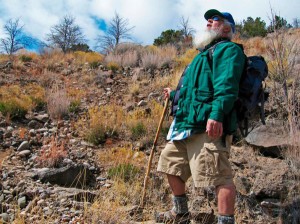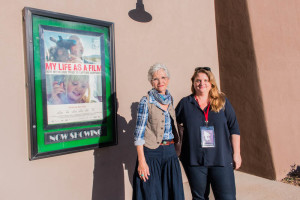Tags
Related Posts
Share This
SFIFF Reviews
On Oct. 23, the Santa Fe Independent Film Festival screened two films at the Screen for film fanatics and students alike. The Caveman of Atomic City and My Life as a Film, both films attracted small audiences comprised of Sunday moviegoers and the older patrons of Santa Fe. Although the attendance on the last day of the SFIFF was disappointing, the movies certainly ended the festival with a bang.
The Caveman of Atomic City, Paul Ratner, 79 min. ★★★★★

Roy Michael “MicroMike” Moore, hiking in Santa Fe.
This documentary follows the story of Roy Michael “MicroMike” Moore, a philosopher and self-taught scientist who chose to lead a simple life by selling his belongings and living inside a cave. MicroMike, written as “µmike”, inhabited a cave on Los Alamos National Laboratory territory for years before his campfire smoke caught the attention of LANL scientists. LANL officials assuming the mountain was ablaze, alerted authorities to the cave where MicroMike lived comfortably and peacefully. He had set up solar panels attached to car batteries for electricity, a wood stove, a bed and tinted windows to keep his presence unknown. MicroMike was evicted from his cave and arrested for possession of and growing marijuana outside his humble abode.
Before MicroMike’s eviction, he stumbled upon what he believes to be a meteor from Mars. He took the meteor home to his cave and studied it relentlessly, holding it in different light and squinting into the many craters littering the rock. After MicroMike was forced out of his cave, he settled for a traditional home in Los Alamos and began to delve deeper into science. With a microscope, MicroMike inspected particles from the meteor and soon realized there was sign of life from another planet inhabiting the meteor he brought into his home. Many times, he was written off by prestigious scientists and labeled “crazy.”
He sent letters upon letters to LANL offering to give the lab his meteor, only asking that the public be informed in return. The film tackles a lot of threads woven throughout MicroMike’s life: his cave dwelling; the meteor from mars; his societal exile and his scientific theory on e=mc2; which is well-worded but hard to believe, that the true equation is e=gmc3, the “G” equaling “God.” Each element of MicroMike’s story was well executed, thorough and hypnotized the attendees sporadically seated in The Screen.
My Life as a Film, Eva Vitija, 77 min. ★★★
When Swiss director Eva Vitija (formerly Eva Scheidegger) was gifted a feature length movie on her life for her 18th birthday, she was infuriated. Her father, filmmaker Joschy Scheidegger, edited together clips he’d collected from her birth to the day she came of age. Scheidegger filmed Vitija and her siblings obsessively, never stopping to sit for a meal at dinner or listen directly to whomever was trying to speak to him. Originally, Vitija was annoyed and irked at her father for shoving the finished product of his distance in her face as if it were worth the years lost behind his lens. But she realized soon after his death he had another motive for his gift. He gifted her the film for a reason bigger than a birthday present: he wanted her to finish his movie.

Director of My Life As A Film Eve Vitija-Scheidegger stands with her mother Claudia Freund after the screening of her movie. Photo by Yoana Medrano.
Vitija set to work on her film after visiting her mother in Santa Fe. She picked through clips shot on her father’s Super8 and digital video camera, piecing together a story through images of her mother, estranged half-brothers, her father’s lover and his adventures in New Mexico. The film itself feels nostalgic without any emotion, Vitija interviews her brother Kaspar Scheidegger as well as her half-brother Dominique Scheidegger, both expelling no emotion for the majority of the time.
The bulk of the emotion radiates from Vitija’s mother, Claudia Freund, whom moved to Santa Fe because of her ex-husband’s infatuation with New Mexico. Freund expresses love and tears for Scheidegger and his passion for filmmaking. Vitija tries to portray her father as a distant, creative, free-spirit who caused her and her siblings a great deal of agony due to his polyamorous instincts and vagabond heart, however, the theme of the film becomes lost in her family woes and grainy footage. The film’s title in its entirety is My Life as a Film: How My Father Tried to Capture Happiness, all the while failing to solely encompass both meanings of the title. Vitija works hard to include all the information she unveils while investigating her father’s life, all the while skimming over the happiness he tried to capture.






 Jackalope Magazine is the student magazine of Santa Fe University of Art and Design. Building on the interdisciplinary nature of our education, we aim to showcase the talent of our university and character of our city.
Jackalope Magazine is the student magazine of Santa Fe University of Art and Design. Building on the interdisciplinary nature of our education, we aim to showcase the talent of our university and character of our city.
Recent Comments